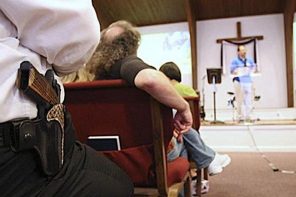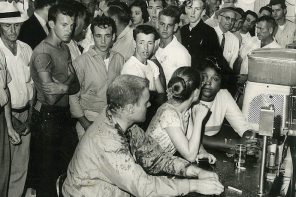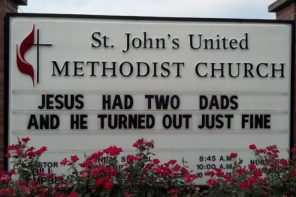The November issue of Harper’s includes the transcript of a talk given by Simon Critchley, chair of philosophy at the New School, aptly titled: “The American Void.” The talk, a meditation on the enigmas of belief in Barack Obama’s piety and politics, provides a window into the president-elect’s existential universe and, by extension, our own. Critchley correctly notes that Obama has made belief in the common good a cornerstone of his campaign, and that his popularity rests in large part on his ability to inspire such belief in others, however sporadically and momentarily. What Critchley can’t get over, however, is the feeling that there is more impossibility than possibility in Obama’s religio-moral vision, summing up his—and our—dilemma thusly: “we must believe, but we can’t believe.”
Working just beneath the surface in the essay is a template for belief, insisted upon by so many Americans, into which Obama clearly does not fit. Critchley returns again and again to the qualities of detachment, doubt, and distance that mark Obama’s piety, musing that, “Obama wants to believe in the common good as a way of providing a fullness to experience that avoids the slide into nihilism. But sometimes I don’t know if he knows what belief is and what it would be to hold such a belief. It all seems so distant and opaque.”
He reminds us that Obama’s turn to Christianity was a very gradual and measured one, a choice and not a sudden conversion experience. Citing Obama’s own words, that “religious commitment did not require me to suspend critical thinking,” Critchley concludes that this is “the coolest, most detached experience of religious commitment.” He intimates that perhaps Obama retains much of his mother’s anthropologist’s approach to religious and cultural formations, respectful but distant. Obama’s decision to join Chicago’s Trinity United Church of Christ was driven by his growing recognition of the importance of a shared community of faith, a social vehicle to give it some structure and public expression. Despite this commitment, Critchley senses a continued aloofness that suggests he has not really solved his mother’s dilemma and its attendant “sense of loneliness, doubt, and abandonment.”
I share Critchley’s sense that Obama provides a window into both the possibilities and impossibilities of faith in our age. But rather than view him as the odd outlier—an enigma—the president-elect strikes me as embodying an increasingly common way of negotiating the contemporary spiritual landscape. The eclectic influences, the measured commitment, and the dance between faith and doubt in his existential universe seem utterly familiar. What is different is that a politician, given the politics of religion in American life over the past few decades, would be as forthcoming as he has been on the topic. This, surely, points to the changing contours of religion and spirituality in our increasingly globalized world.
Recent studies lend support to these shifts, buttressed by the mounting anecdotal evidence. Earlier this year the Pew Forum on Religion and Public Life released a new survey that revealed the fluidity of religious affiliation in the United States—the porousness of denominational and traditional borders. More than one-quarter of the population has switched from the religious tradition in which they were raised, spiking to 44% when you include shifts among Protestant denominations. And, while 16% of Americans are unaffiliated with any particular tradition, a number that has increased significantly over the past decade, there is still no good gauge for the common refrain about being spiritual, but not religious.
Theology of Doubt
A 2004 interview with Obama—just released last week—sheds light on some of the complexities of his spiritual orientation. In response to the first question, what do you believe, he states first and simply “I am a Christian.” But his qualifications and clarifications are more revealing, showing a far more complex spiritual brew. After noting that he draws from the Christian faith, he proceeds to identify other significant spiritual influences, through family, geographical locale, and intellectual engagement.
Perhaps most significant among these is the suggestion that his “polyglot background” and “book learning” contributed to his eclectic spiritual formation. Particularly striking is his recurring emphasis upon not just the presence, but the theological importance, of doubt as a component of religious conviction. As he flatly puts it, “I think that religion at its best comes with a big dose of doubt.” Dogmas and doctrines, as he sees it, presume to know too much, and contribute to the “enormous amount of damage done around the world in the name of religion and certainty.” He refuses to believe that he has a “monopoly on the truth, or that my faith is automatically transferable to others.”
Hardly the offhand remarks of an interview several years past, Obama’s emphasis upon the intertwining of faith and doubt has remained a prominent feature of his marathon presidential run. The evidence can, in fact, be found in the pull quote at the very top of the campaign’s page on faith from the Washington Post‘s E. J. Dionne: “Obama offers the first faith testimony I have heard from any politician that speaks honestly about the uncertainties of belief.”
Given his spiritual eclecticism and conviction that there are “many paths to the same place,” how does Obama explain his decision to commit to a particular faith tradition? Significantly, he cites the “particular attributes of the historically black church” that grow out of its centuries-long struggle against slavery and American apartheid. This tradition had to pay attention to the “whole person,” unable to afford a focus on a private faith or salvation separated from a broader social transformation. In this tradition Obama saw that faith was not merely compensatory or a palliative against suffering, but “an active, palpable agent in the world.” This faith tradition transgressed the border between religion and the secular, allowing him to see that “religious commitment did not require me to suspend critical thinking, disengage from the battle for economic and social justice, or otherwise retreat from the world that I knew and loved.”
The politics of religion in American life have allowed the religious right to “own” religion, and the media has played along with this narrative for the past two decades. Deeply critical of the “strategies of avoidance” among progressives regarding religion—which has allowed conservatives to define religion publically—Obama offers a different trajectory; it is not your “old-time religion” with claims to exclusive truth or absolute certitude; it is not a form of religion that positions itself against the secular world as its antagonist and antithesis. It is a form of religiosity that refuses the binary of religion and secularism which has privatized and depoliticized religion and set up a sharp opposition between faith and reason. It is a form of religiosity that draws more eclectically upon multiple traditions, in negotiation with the broader political and social world. This form has more purchase among Americans than we have been led to believe in the face of the conservative religious ascendency and its media monopoly of recent years.
So what are we to make of the elements of distance and doubt that Critchley correctly detects in Obama’s piety? I am not willing to conclude, as he does, that it captures the tragedy of “a change we can believe in and the crushing realization that nothing will change.” If we escape from this all or nothing thinking, we can better see that the yearning for transcendence is not its fulfillment, and belief is not an overpowering conviction that erases all doubts, questions, and distance. Our challenge is not to choose from the false opposition between politics or piety, the conflicted world or the dream of its transformation, but to mediate these tensions in the perennial hope that small changes are always possible.




